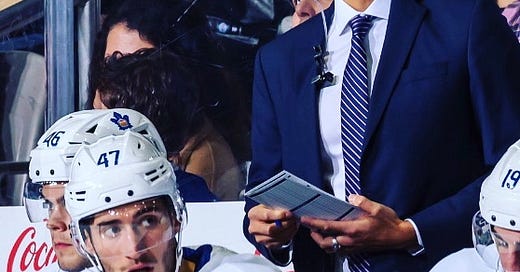Hey Jack,
I have a question that's a bit outside of your normal hockey discourse, but may still be of interest to you:
As a youth coach, how can I maximize the fulfillment that my players get out of hockey in the short term (during this session/season) and best create a foundation for hockey to be fulfilling long term part of their lives (if they choose to continue)?
Just for a bit of context - After coaching the bantam and squirt level, I switched to running the Learn To Play program for a hockey org. I take kids ages 4-8 who mostly have never played or even ice skated and teach them the basics over 12ish weeks. It's a totally different skillset then coaching older youth but I've grown to love the challenge. My organization's goal is to make hockey as accessible to as many kids and families as possible. My personal edict speaks to the question that I posed to you - how can I maximize fulfillment for these kids.
I'm in a secondary hockey market where there's a low likelihood any of my kids will reach elite levels (and there are other programs that better cater to that goal). I personally never played elite youth hockey, but my time spent in house leagues, high school hockey, adult recreation leagues and now coaching has been incredibly rewarding to me. I want to know if there's anything I can do to influence hockey becoming a healthy and fulfilling part of my player's lives.
Thanks!
-Nathan
Hey Nathan,
While I’m in full agreement that having fun should be Goal Number One for kids who are just learning to play our sport, I don’t think that should be your focus heading into a season.
Here’s the thing.
Kids can have fun without the presence of a coach. And they often do!
So why do they need you, then?
I’d argue that a coach’s purpose is to help their athletes overcome self-limiting beliefs through action.
Every season you’ll meet at least one player who thinks that:
They’re not very fast
They’re not very strong
They don’t have a very good shot
They’re not very smart
They’re no good at all
You can brighten someone’s day by coaching them with good humor and light-heartedness, by helping them have fun. But if you give that person some tools with which to dismantle their negative self-talk, you change the trajectory of their life.
Maybe the slow kid can get quicker by making plays inside movement.
Maybe the weak kid can play bigger than he is.
Maybe the kid with a poor shot just needs a shorter stick.
Maybe the dumb kid has never had a coach who really knew what they were talking about.
In my final high school tournament, we are tied 0-0 against the host team midway through the third period.
We get a 5v3 powerplay and I score off the draw with a snap shot that just sneaks under the goalie’s blocker.
With a minute left in the game, a teammate is called for a minor penalty.
Coach taps me on the back.
“But I don’t penalty-kill,” I reply. I was one of our team’s least proficient defensive forwards. I just don’t penalty-kill.
“Go,” he insists.
The linesman drops the puck and I set up tentatively in the neutral zone, waiting for the opposing team’s entry attempt.
Somehow the play breaks down and the puck rolls to me just outside our blueline.
I send a prayer of a shot down-ice.
The puck first appears to be headed toward the corner, but then flips on-edge and rolls into the net.
We win 2-0.
For the first and only time in my playing career, I’m named Player of the Game.
The home crowd boos.
Then they start cheering.
I’m 16 years old and, in that moment, something changes inside of me.
All that because of a two-lettered word.
That’s a coach’s purpose.



